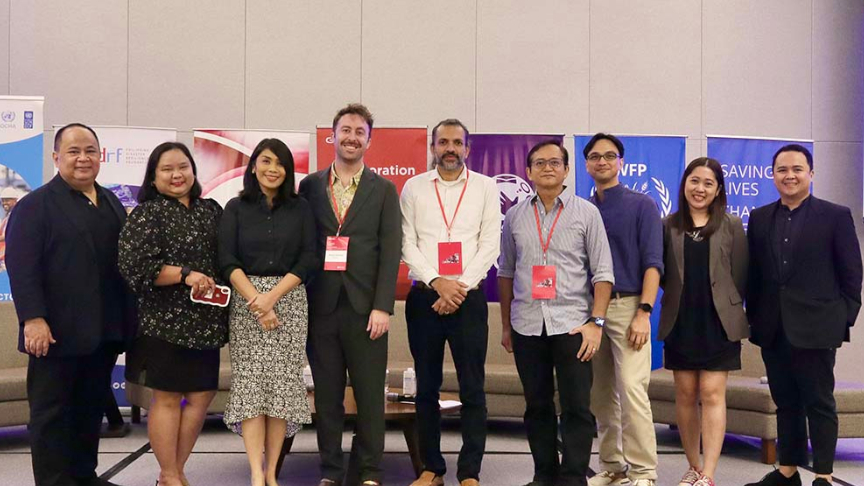PLDT Inc’s (PLDT) wireless arm Smart Communications, Inc (Smart) showcased its disaster resilience initiatives alongside representatives from local and international mobile network operators (MNOs), government and non-government organizations during GSMA’s Humanitarian Connectivity Charter (HCC) Asia Pacific workshops recently held in Clark, Pampanga.
Smart was among the first operators in the world to adopt the principles of GSMA’s HCC, which was launched in 2015. The HCC is a set of principles and best practices reached collaboratively between mobile network operators (MNOs) on how to prepare for, respond to, and recover from a sudden onset emergency. Since it was launched, there have been more than 160 MNO signatories of the HCC, operating in 112 countries.
“We are honored to be part of this milestone event led by our partners from the GSMA, alongside our esteemed colleagues from across the region. For a country like the Philippines, which is located on the Pacific Ring of Fire and is visited by several typhoons every year, disaster preparedness and resilience are a must, and telcos, especially mobile, play a vital role in disaster response,” said PLDT First Vice President for Network Eric Santiago.
Rudyard Ranjo, Center Head and AVP for Network Service Operations at Smart, presented the PLDT Group’s initiatives to build a more resilient network to connect Filipinos and provide critical connectivity services, especially during emergencies and disasters, as well as the Group’s programs under its #SafeAndSmart advocacy, underscoring PLDT and Smart’s responsibility and critical role in bolstering the country’s disaster resilience.
“This global forum is an excellent opportunity to hear from our experts, as well as learn best practices from each other, as we strive to be more resilient and effective to prepare, fast and efficient to respond, and decisive and relentless to recover. All of these are to make sure that our customers are connected to their families amidst emergencies & other disruptions,” Ranjo said.

The global forum was attended by delegates from Bangalink (Bangladesh), Ooredoo Indosat Hutchison (Indonesia), Globe Telecom (Philippines), United Nations Office for the Coordination of Humanitarian Affairs, United Nations Development Programme, World Food Programme, International Telecommunication Union, USAID, Asia-Pacific Telecommunications (APT), Nepal National Disaster Risk Reduction and Management Authority (NDRRMA), Department of Information and Communications Technology (DICT), Philippine Disaster Resilience Foundation (PDRF), Komunidad, India Centre for Development Telematics (CDOT), UN Global Pulse, Oxfam Philippines, Oxfam Myanmar, UNCDF, McKinsey, Green Climate Fund, Ericsson Response, Fiji Business Disaster Resilience Council, Asia-Pacific Broadcasting Union (ABU) and Internews.
During the two-day event, participants learned more about best practices in disaster response and disaster resilience, listened to experts discuss early warning systems, and participated in breakout sessions and interactive disaster simulation exercises.
PLDT and Smart also turned over a Ligtas Kit to the DICT Region 3 at the sidelines of the delegates’ visit to the PDRF Operation Center, which is also located in Clark.
As presented at the GSMA HCC Workshop by Stephanie Orlino, AVP and head of Stakeholder Management at PLDT and Smart, “the Ligtas Kit is an all-in-one communications package that provides quick, emergency communications support to communities in times of a disaster through power, mobile technology, and connectivity equipment.”
Each kit carries a power station, solar panel, rechargeable megaphone, crank radio, satellite phone, smartphone, Smart LTE pocket Wi-Fi, rechargeable flashlight, and whistle. Aimed at strengthening disaster management initiatives, the Ligtas Kit has enabled local government units and Disaster Risk Reduction and Management Offices (DRRMO) to maintain their access to communication during catastrophic events. They can also extend communication aid to the rest of their constituents by setting up free calling and charging stations with the help of the communication devices included in the kit.
Smart’s support for the HCC is aligned with the PLDT Group’s longstanding #SafeandSmart advocacy, which promotes preparedness and immediate response through network resilience, continuous availability of communication services, mobile solutions and activities, and relief assistance to help communities mitigate disaster risks.
These initiatives also underscore the commitment of PLDT and Smart to attaining UNSDG #11: Sustainable Cities and Communities.







































































































